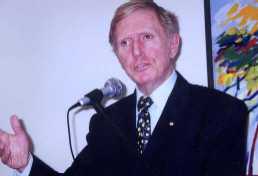Social justice
By: Justice Michael Kirby (Sep 19 2022)Social justice, religious leaders and homosexuality
A talk given by Justice Michael Kirby
to students of St Ignatius College, Riverview
 An upbringing in religious values affords many instances of saints and heroes. They are generally troublesome people who look ahead and speak up. Where necessary, they stand bravely against established power, even against the whole world. This is why our heroes include Thomas More, Martin Luther, Deitrich Bonhoeffer, Rosa Parks, Martin Luther King and Nelson Mandela.
An upbringing in religious values affords many instances of saints and heroes. They are generally troublesome people who look ahead and speak up. Where necessary, they stand bravely against established power, even against the whole world. This is why our heroes include Thomas More, Martin Luther, Deitrich Bonhoeffer, Rosa Parks, Martin Luther King and Nelson Mandela.
In some matters of social justice-Aborigines, refugees, the poor and unemployed, alcoholics and the sick and dying-the churches have an admirable record of defending human rights. They stand up like heroes. But in other matters-the role of women, the predicament of drug-dependant people and sexuality-they have a long way to go.
It has been reported that the Anglican and Catholic archbishops of Sydney have reminded their congregations of what they say are church teachings that homosexual acts are contrary to moral law. I am not competent to engage with these reverend men in theological debate, but I can give you another point of view, drawn from my own experience.
When I was at school in the 1950s, no one spoke about homosexuality. There was very little talk at school about sex generally. Sometimes there was schoolboy derision of certain students as ‘poofters’. But for the most part the subject was well and truly locked in the closet.
It was at high school that I realised that I was gay. I also discovered that my church, my school friends and my society expected me to be thoroughly ashamed of myself. I was supposed to keep totally silent and to hide my feelings. I thought that there was no one that I could talk to about them. If I showed my feelings or tried to respond to them, I ran the risk of being caught by the police and locked in jail. I never really accepted these attitudes. But I went along with them, as most people did in those days. It was a lonely time of denial – even from my family.
I want to tell you that gays and lesbians exist, as they always have, in every walk of life. They are no better and no worse than other people. They have most of the same problems and joys and worries and hopes as heterosexual people have. Many have a long-term partner, as I have. Most have families, mortgages and domestic pets. Nowadays more and more are unwilling to go along with the game of shame.
As you grow up, you will meet many people who are homosexual. They may be footballers, musicians, truck drivers or judges. You should refuse to join the herd mentality that calls them ‘poofters’, ‘queers’, ‘faggots’ or other words of hate. You should reject ‘poofter bashing’ and harassment of people you think might be gay. This is the conduct of cowards. These are the attitudes that led to the burning of heretics, the Holocaust, the Pink Triangle of the Nazis and the genocide in Cambodia and East Timor. Such wicked conduct is only stopped when ordinary people reject the philosophy of ‘don’t ask, don’t tell’ and fully accept their fellow human beings in all of their diversity.
Often it takes the churches a long while to see the errors of their ways. Ultimately they tend to get it right. Martin Luther’s call for the use of modern languages in the place of Latin caused a terrible fuss. Galileo narrowly escaped burning as a heretic for teaching that the universe did not circle the Earth. Some protestant churches in South Africa claimed a scriptural basis for apartheid. Nobody defends such wrongs today. Usually the churches belatedly apologise.
I believe that there is now another matter upon which the churches-yours and mine-will ultimately realise their mistake. It concerns homosexuals. In May last year, two fine catholics, Sister Jeannine Gramick and Father Robert Nugent, were prohibited from continuing their ministry to a gay and lesbian congregation in Maryland in the United States. They had done so for 20 years. Gramick and Nugent were told by their bishop that they must cease their ministry because they were not teaching the authentic doctrine of the church. They were not instructing their congregation about what was described as the ‘intrinsic evil’ of homosexuality.
‘Intrinsic evil’ is a very serious verdict. It is the kind of language that, I believe, inflames hatred by outsiders and self-doubt and loathing amongst those concerned. I for one deny that I am ‘intrinsically evil’. Boringly enough, I think I am quite a good man. I respect and uphold the human rights of others. I do not think that it is too much to expect that others will respect my human dignity for who I am.
To demand a life of celibacy of the millions of homosexual people in this world-as some churches do-is not only totally unrealistic, it is completely unreasonable. Indeed, for most of humanity it is seriously unnatural.It amounts to an important aspect of personhood which is impossible and wrong to demand of all but a very few who are suited to the celibate life. In my experience, few if any gay and lesbian people choose their sexuality. It is like your gender, your skin colour or being left-handed. From the earliest days of puberty, you just know how you are. And if that is how you are, that is how God meant you to be.
With the wonderful intelligence that we were given at our birth and with the lesson of love and reconciliation that we are taught by our religion, we have, I believe, a duty to reject the notion that homosexuals and their sexuality are ‘intrinsically evil’. They are not. Those who suggest that they are carry a very heavy moral responsibility for the hate crimes, the bashings, the denigration, the family rejections, the shame, the suicides, the despairing exposure to HIV and the lonely denial that they inflict on other human beings.
Among gays and straights, there is a need to stand up bravely together on these issues and to confront hatred and error. In due course, the churches will get it right. Let us hope that we do not have to wait too long for this apology.




